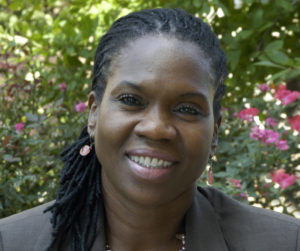The naturally curly texture of the hair of many African-Americans is not something schools should be spending their limited time and resources regulating, says an expert on implicit bias and the law at Washington University in St. Louis.
“Several school districts around the nation have adopted policies that prevent students from wearing their hair in braids, twists, dreadlocks and Afros, and even Afro puffs,” said Kimberly Norwood, the Henry H. Oberschelp Professor of Law and professor of African and African-American studies in Arts & Sciences. “These styles are typically excluded as unprofessional, extreme, distracting or faddish; these conclusions are wrong and have a discriminatory impact on one group of students in particular: African-descendant students.”

In May, an African-American female high school student at North Florida Christian School in Tallahassee was informed that she would be unable to attend the school in the fall if she continued to wear her hair in an Afro. A week later, twin sisters were issued detention and barred from participating in extracurricular activities and attending prom at Mystic Valley Regional Charter School in Boston because they refused to change their braided hairstyles, which school officials deemed distracting and faddish in violation of the school’s grooming policy.
Norwood decided to weigh in on the issue along with three other legal scholars: Wendy Greene of Cumberland School of Law at Samford University; Trina Jones of Duke University School of Law; and Angela Onwuachi-Willig of University of California, Berkeley, School of Law. The four drafted a letter, which ultimately attracted more than 120 U.S. and international academic signatories, and sent copies to both North Florida Christian School and Mystic Valley Regional Charter School.
In the letter, the group highlighted some of the harmful effects of such policies: They essentially require African-descendant girls to change their natural hair texture with the aid of chemical relaxants or extreme heat, processes that can be expensive, time-consuming and damaging to one’s hair, scalp and emotional well-being; cover their hair with wigs or weaves; or cut it off altogether. The group urged the permanent rescission of such policies.
Although Mystic Valley Regional Charter School temporarily suspended the ban at the end of the 2017 school year, Norwood said temporary suspension is not enough. The girls, for example, have no idea whether the temporary suspension will be lifted by the time school starts this fall. Additionally, similar disciplinary actions have existed in other school districts throughout the nation — Louisville, Ky., Tulsa, Okla., Orlando, Fla., and Lorain County, Ohio, to name a few — and even extend outside the United States, as in Pretoria, South Africa.
“These hair polices are just wrongheaded,” she said. “They are discriminatory because they prohibit nearly all African-descendant students from wearing their hair in the very way that it grows out of their heads while allowing white students to wear their hair in the very way that it grows out of their heads. Can you imagine a policy that prohibits white girls, many of whom are born with straight hair, from wearing their hair straight? Absolutely not! Yet we have schools across this nation saying to African-descendant students not to wear their hair in Afros and other styles that maintain the natural structure and texture of the student’s hair, and even urging the students to straighten their hair.”
The NAACP Legal Defense and Educational Fund and the American Civil Liberties Union, among others, now represent the twin girls from Mystic Valley Regional Charter School, and they are exploring legal actions to ensure that black students can attend the school without having their educational experience disrupted because they do not have straight hair.
“If the hair is neat, clean and well-groomed, how can it be distracting or faddish? Why is the hairstyle automatically banned, sight unseen? These styles are the only ways that we can maintain our hair in its natural texture and structure. Why is our hair objectionable? What is really going on here?” Norwood said.
Norwood believes that these grooming determinations are the product of implicit biases doing double duty. The first bias concludes that the naturally textured hair of the African-descendant student is unnatural, unacceptable and even punishable. The second bias prefers straight hair and treats it as normative.
Their letter explained that the demands imposed on African-descendant girls to alter or disguise their natural hair texture is unfair, unduly burdensome and “tantamount to asking an African-American to lighten her skin color so as to appear white or to obtain rhinoplasty to narrow her nose so that her nose does not appear to be as stereotypically African.”
The letter urged the schools to permanently rescind these grooming policies. It also was directed to the heads of all 50 states’ departments of education and will be sent to the presidents of school board associations throughout the country, Norwood said.
“It is our hope that our educators and K-12 policymakers will recognize that there is nothing wrong or unacceptable about African-American hair, and that they will implement training and policies that convey this knowledge,” Norwood said.
Comments and respectful dialogue are encouraged, but content will be moderated. Please, no personal attacks, obscenity or profanity, selling of commercial products, or endorsements of political candidates or positions. We reserve the right to remove any inappropriate comments. We also cannot address individual medical concerns or provide medical advice in this forum.